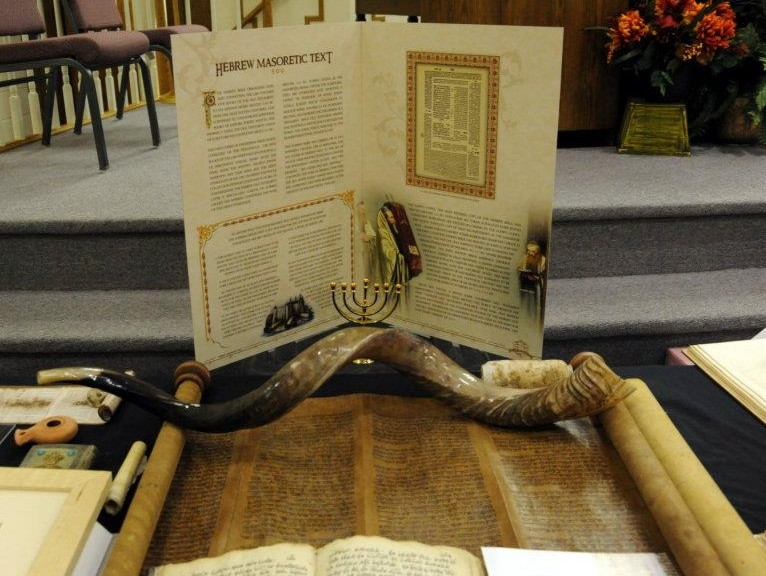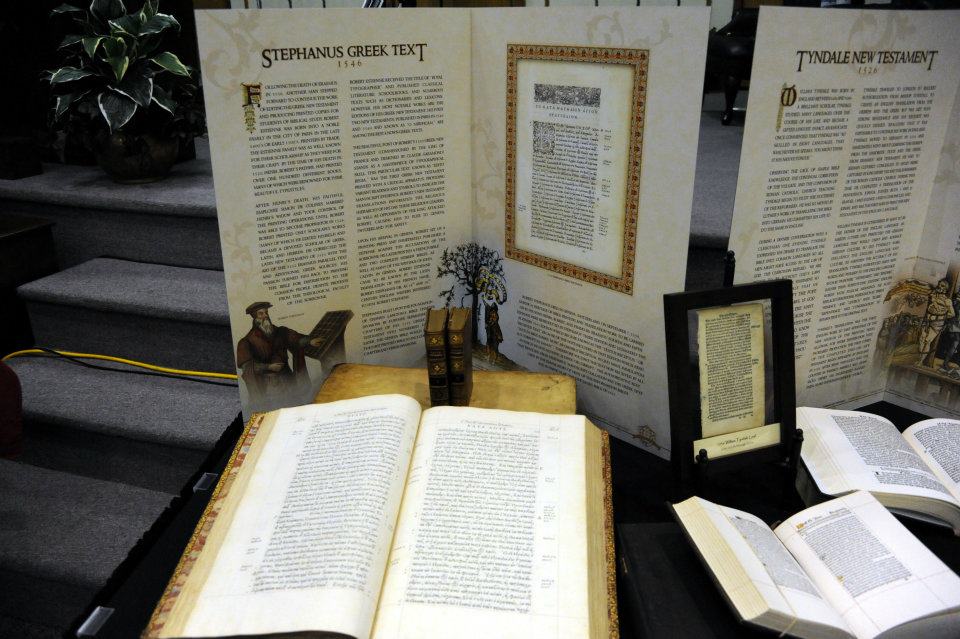TEMPLE OF SOLOMON.
Solomon's
temple, erected to the honour of Jehovah,
was the most splendid and sumptuous
edifice that ever was reared upon earth.
It was built upon mount Moriah at Jeru-
salem, the sacred spot on which the
LORD appeared to Abraham when he
was offering up his son Isaac.
Like the
tabernacle of Moses, it was constructed
after a model given by Divine inspiration,
by architects and artificers, the chief of
whom are believed to have been specially
endowed with widsom and skill from
God, 1 Kings 7:14; 2 Chron. 3:3; Gen.
22:2, 14. David had projected this
work; but he was forbidden by the
prophet to undertake it, while Nathan
assured him, that God would enable his
son to accomplish it in a manner worthy
of its design: for which purpose the king
and his princes made prodigious prepa-
rations, and contributed 108,000 talents
of gold, and 1,017,000 talents of silver;
which together, if reckoned according to
the Mosaic talent, the correctness of
which some have doubted, must have
amounted in weight to 46,000 tons of gold
and silver, and in value to more than
£1,000,000,000 sterling, 1 Chron. 22:14;
29:3, 7. Besides the sacred house
itself, numerous chambers and apart-
ments were added, to an extent far more
than equal to the chief building, so as to
make it altogether a most magnificent
structure. About 184,000 workmen and
overseers were employed in constructing
this great edifice with its various vessels
and furniture; and though urged forward
with all possible expedition, it occupied
them seven years and six months, 1 Kings
5:13, 16; 2 Chron. 2:17, 18. When com-
pleted, a national convocation was called,
and the sacred edifice was dedicated to
God by a solemn prayer from king Solo-
mon. During the festival, which lasted
fourteen days, 22,000 oxen and 120,000
sheep were sacrificed as a peace-offering,
and for the supply of the people: God
accepted the offering of the house to his
service, and signified his approbation by
fire from heaven to consume the sacri-
fices, and by the visible cloud of the glory
of the LORD, which filled the house of
God, 1 Kings 8.; 2 Chron. 5.; 7:1-11.
Solomon's temple existed in its primitive
glory only about thirty-four years: for
his shameful idolatries, which he prac-
tised to gratify his heathenish wives,
provoked the LORD; and as his son
Rehoboam walked in the steps of his
father in his degenerate state, ten tribes
of the people revolted from him, and, as
a further punishment, God gave him into
the hands of Shishak, king of Egypt, who
carried away the royal and the sacred
treasures from Jerusalem, 1 Kings 12:
15; 14:21, 25, 26; 2 Chron. 12:1-10.
Divine worship was still continued in
the temple of God, but idolatry prevailed
among the people, and the house of the
LORD was dishonoured under several
kings. Asa gave a large portion of its
remaining precious furniture to Benha-
dad, king of Syria, 1 Kings 15:15, 18.
Joash, and the high-priest Jehoiada, re-
paired the temple, but soon after the
king gave its sacred treasures to Hazael
king of Syria, who had threatened to
pillage Jerusalem, 2 Kings 12:4, 18.
Ahaz was a gross idolator; and he
stripped the temple to procure the assist-
ance of Assyria, against the king of Syria,
16:1-18; and for a long time the doors
were closed, 2 Chron. 18:21, 24. Heze-
kiah repaired the temple, replacing such
of the sacred vessels as were wanting;
but he was obliged to give much of its
gold and silver to propitiate Sennacherib
king of Assyria, 29.; 30.; 2 Kings 18:
4, 14-16. Manasseh, in the
former part
of his reign, appeared as a monster of ini-
quity: he even reared altars to the host
of heaven and to idols in the courts of
the temple: but he afterwards repented,
and restored the true worship of God,
21:2, 11; 2 Chron. 33:14-19. Amon's
was a reign of destructive wickedness:
but Josiah repaired the temple and re-
placed the ark of God in the most noly
place, 2 Kings 23.; 2 Chron. 34.;
35. Idolatry and wickedness con-
tinued to prevail among the people, who
profaned the house of the LORD, and,
with every species of abuse, rejected the
ministry of his faithful servants the pro-
phets; when, in the year 606 B.C.,
Nebuchadnezzar was permitted to gratify
his ambition, by seizing Jerusalem, and
carrying away the sacred vessels to Baby-
lon; and, the people continuing to reject
the counsels of the prophet Jeremiah,
that proud monarch returned to the holy
city in the year 588 B.C. and utterly
destroyed the magnificent temple of
Solomon, with the whole city of Jerusa-
lem, 2 Kings 25:1, 9; 2 Chron. 36:
10-20; Jer. 52:12, 27.
TEMPLE, THE SECOND.
Zerubbabel,
the prince of the Jews, led back nearly
50,000 of the people from Babylon to
Jerusalem, under the decree of Cyrus,
and rebuilded the temple of God, Ezra 1.
2. 3. Vehement opposition was made
by powerful enemies; but the work was
of God; and, encouraged by the prophets
Haggai and Zechariah, and sanctioned by
new decrees of Artaxerxes and Darius,
the temple was finished in about twenty
years, and dedicated in the year 515 B. C.
Though larger in its dimensions than the
temple of Solomon, it was incomparably
less splendid in appearance; and it
wanted, as the Jews acknowledge, five
things, which the former possessed: 1,
the Ark and its furniture; 2, the She-
chinah, or cloud of the Divine presence;
3, the Holy Fire; 4, the Urim and
Thummim; and 5, the Spirit of prophecy;
Ezra 1. 3. 5. 6. This temple underwent
various changes, as the people obeyed or
provoked the LORD. Antiochus
Epi-
phanes king of Syria, about the year 167
B. C., plundered the temple of about 800
talents of gold, and abolished the services
of Divine worship, under circumstances
of extraordinary impiety and cruelty.
Judas Maccabeus recovered the city after
three years, repaired the temple, and
restored the ordinances of God. Herod
the Great, however, finding it much di-
lapidated, after it had stood nearly 500
years, began to rebuild it in the year 17
B. C., for the purpose of securing the
favour of the Jews. The temple was
rendered fit for Divine worship in the
ninth year; but Herod continued to
enlarge and embellish it to the end of his
reign; and its magnificense and splen-
dour, in white marble and gold, as de-
scribed by Josephus, rendered it one of
the most astonishing structures in all the
world, Matt. 24:1, 2; Mark 13:1;
John 2:20. Messiah appearing
personally
in this second temple, it was filled with
greater glory than the temple of Solomon,
Hag. 2:9: and having completed his
ministry, thereby superseding the typical
institutions of the Levitical law, and the
Jews having rejected the gospel dispen-
sation of mercy, crucifying the Lord of
glory, and persecuting His apostles, and
still proceeding in their national crimes,
God permitted the city and temple to be
utterly destroyed by the Romans, under
circumstances of unparalleled sufferings,
as predicted by Christ, A. D. 70.
Jeru-
salem still continues, as our Saviour
fore-
told, "trodden down of the Gentiles,"
Luke 21:24: and a temple to the false
prophet now pollutes the consecrated
summit of Mount Moriah, into
which no
Jew or Christian is allowed to enter on
pain of death, or a solemn surrender as a
[radical] disciple of Moh_mm_d!
TEMPLES, the upper parts of the sides
of the head, Judg. 4:21; 5:26.
TEMPORAL, measured by or relating to
time, 2 Cor. 4:18.
TEMPT, to try, or exercise with a trial;
as God exercised Abraham, to illustrate
his fidelity and obedience, in relation to
the Divine promises, Gen. 22:1: to
endeavour to deceive or ensnare, as the
devil seeks to
delude



